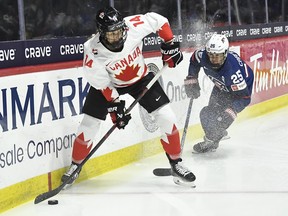
PWHL played big role in Renata Fast’s IIHF awards haul
Life isn’t quite back to normal for Troy Ryan’s PWHL Toronto squad, but no one is complaining.
The aura of a gold-medal celebration hangs over the operation even if only Ryan, GM Gina Kingsbury and goalkeeper Kristen Campbell were actually back at practice on Tuesday from the group that was in Utica, N.Y., for the tournament.

The other contributors to Canada’s gold medal at the IIHF women’s world hockey championship — defenders Renata Fast and Jocelyne Larocque and forwards Sarah Nurse, Blayre Turnbull, Emma Maltais, and Natalie Spooner — were all allowed one full day to recharge before they will rejoin their PHWL teammates for a trip to Boston where the team plays on Thursday.
Examples of the impact the PHWL has had on the women’s game at the international level were littered throughout the tournament, but none was greater than the performance put forth by Fast, the veteran blue-liner and mainstay on the national team.
Long accepted to be half of the best defensive pairing in the women’s game along with Canadian and Toronto teammate Larocque, Fast and Larocque again assumed that role in the tournament, logging close to just over 23 minutes a game in helping Canada to its 13th world championship gold.

But what pushed Fast over the top in garnering Best Defender at the women’s worlds was the addition of an offensive game Ryan and his PWHL coaching staff have been pushing since the season began.
In addition to the always steady defensive job both she and Larocque produced, helping Canada hold the opposition to just eight goals in seven games, five of those coming in the gold-medal final, Fast and Larocque too, for that matter, were key contributers offensively.
Larocque’s five points put her in a three-way tie for second in Canadian team scoring with Laura Stacey and Kristin O’Neill while Fast led the team with six points, three goals and three assists.
The two Toronto PWHL defenders also led the team in plus-minus with Larocque a plus-16 for the tournament and Fast a plus-15.

Ryan has been on his defence in Toronto and carried that into his Team Canada duties to jump into the play when there are opportunities to score. He and his coaching staff in Toronto and at the worlds encouraged the defenders to think offensively and built a culture where offensive contributions came from all five skaters on the ice, not just the three forwards.
Fast’s three goals in the tournament are a testament to her growing confidence in her own offensive game. It doesn’t hurt, either, that her ability to get up and down the ice allows her to recover to her defensive position before most opponents can even get the puck into the offensive end.


Leave a Reply